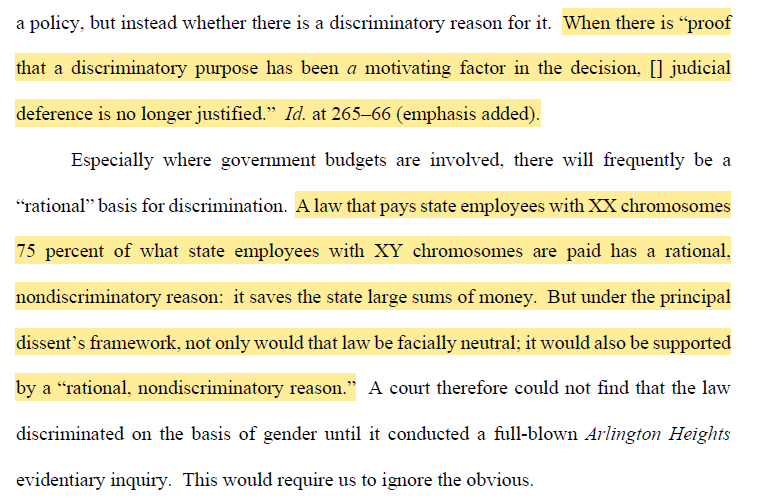National
House votes again to repeal ‘Don’t Ask’
Will the Senate follow suit before time is up?
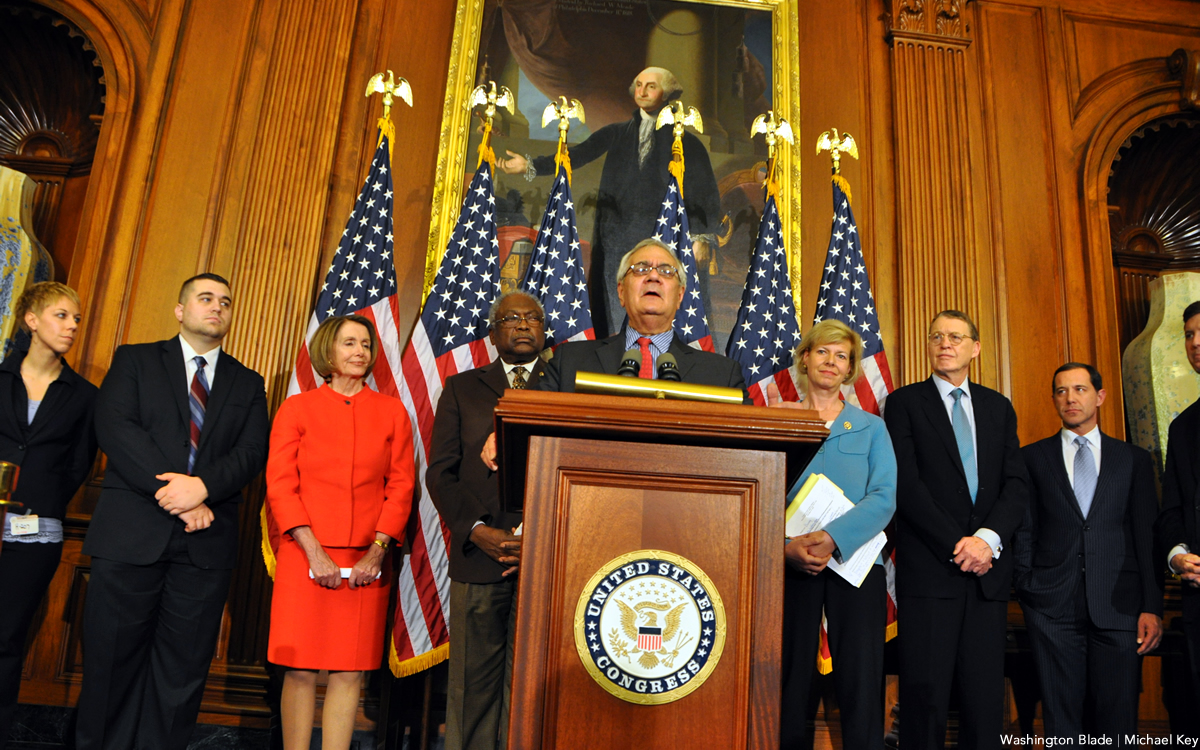
The U.S. House today approved by a 75-vote margin a measure that would repeal “Don’t Ask, Don’t Tell” as eyes shift once again to the Senate to see if the chamber will act to lift the military’s gay ban.
The measure to repeal “Don’t Ask, Don’t Tell” passed by a vote of 250-175 after more than an hour of floor debate in which lawmakers engaged in often passionate discourse both in favor and in opposition to the 1993 law.
After lawmakers cast their votes, Rep. Barney Frank (D-Mass.), the longest-serving openly gay lawmaker, banged the gavel at the podium and declared the final vote tally for the legislation.
During debate, those who spoke in favor of the repeal said lifting “Don’t Ask, Don’t Tell” would end a discriminatory policy, while opponents of repeal said open service would jeopardize military effectiveness.
U.S. House Speaker Nancy Pelosi (D-Calif.) said the vote to repeal “Don’t Ask, Don’t Tell” represented an opportunity to “close the door on a fundamental unfairness in our nation.”
“Repealing the discriminatory ‘Don’t Ask, Don’t Tell’ policy will honor the service and sacrifice of all who dedicated their lives to protecting the American people,” she said.
Rep. Patrick Murphy (D-Pa.), the sponsor of repeal legislation in the House, said the vote for repeal was necessary to protect U.S. service members in the battlefield.
“Our troops are the best of the best, and they deserve a Congress that puts their safety — and our collective national security — over rigid partisan interests and a close-minded ideology,” Murphy said.
The Pennsylvania lawmaker noted the Chairman of the Joint Chiefs of Staff Adm. Mike Mullen has said open service should be implemented to protect the integrity of the U.S. military.
“Well, this is also about the integrity of this institution — of this Congress,” Murphy said. “This vote is about whether we’re going to continue telling people willing to die for our freedoms that they need to lie in order to do so.”
The vote marks the second time this year that the House has approved a “Don’t Ask, Don’t Tell” repeal bill. In May, the chamber passed a repeal measure on the floor as an amendment to the fiscal year 2011 defense authorization bill by a vote of 234-194. The “Don’t Ask, Don’t Tell”-inclusive defense legislation failed to pass in the Senate.
Opposition this time around came from many Republicans, including Rep. W. Todd Akin (R-Mo.), who said the vote on repeal represented an attempt fto impose a “social agenda” on the U.S. military during wartime as operations continue in Iraq and Afghanistan.
Akin blamed House leadership for failing to pass a defense authorization bill — which he called an “eclipse of reason” because it has consistently passed in Congress for the past 48 years — and said Congress should pass funds for troops through the defense legislation before moving to “Don’t Ask, Don’t Tell.”
Rep. Buck McKeon (R-Calif.), ranking member of the House Armed Services Committee, was also critical of Pelosi for bringing the repeal measure to the floor at this time and said the timing wasn’t right Congress to act on “Don’t Ask, Don’t Tell.”
“The speaker has decided once more to subvert regular order … and bring to the floor [a measure] to repeal ‘Don’t Ask, Don’t Tell,” McKeon said.
Among other things, McKeon was critical of how the House was holding a vote on “Don’t Ask, Don’t Tell” before House committees had heard testimony on the Pentagon report on lifting the gay ban. Two days of hearings have already taken place earlier this month in the Senate on the report.
In response to Republicans’ assertions, Frank disputed that proper procedure hasn’t been followed on moving to “Don’t Ask, Don’t Tell” and noted that Republicans were responsible for filibustering the defense authorization bill in the Senate.
Frank noted the repeal measure had already passed in May by the full House and the Senate Armed Services Committee and said the notion that the committees of jurisdiction have been deprived on the issue was “delusional.”
“We’ve gone through triple regular order,” he said.
Among the 175 who voted against the repeal measure were 15 members of the Democratic caucus. They include House Armed Services Committee Chair Ike Skelton (D-Mo.), as well as Reps. Solomon Ortiz (D-Texas) and Dan Boren (D-Okla.).
Republicans who voted in favor of passing the legislation tallied out at 15 — which was 10 more Republicans than those who voted in May in favor of the “Don’t Ask, Don’t Tell” amendment.
Among the Republicans voting for repeal for the first time were Reps. Mary Bono Mack (D-Calif.), David Dreier (R-Calif.) and Dave Reichert (R-Wash.).
Passage of “Don’t Ask, Don’t Tell” repeal in the House first enables the chamber to send the legislation to the Senate as as “privileged” legislation.
The maneuver means the Senate won’t need 60 votes for the motion to proceed on the legislation, taking off the 30 hours of waiting time that would have been necessary were cloture filed on the measure. That’s significant as time is running out in the lame duck session.
Still, even though the first round 60 votes for the motion to proceed won’t be necessary, 60 votes would still be necessary in the Senate to move to final passage of the bill. Sens. Joe Lieberman (I-Conn.), Susan Collins (R-Maine) and Mark Udall (D-Colo.) this week pledged commitment to a stand-alone Senate repeal bill.
In a statement, President Obama praised the House for approving — with what he called “bipartisan support” —the “Don’t Ask, Don’t Tell” repeal legislation.
“Moving forward with the repeal is not only the right thing to do, it will also give our military the clarity and certainty it deserves,” Obama said. “We must ensure that Americans who are willing to risk their lives for their country are treated fairly and equally by their country.”
Geoff Morrell, a Pentagon spokeperson, also said Defense Secretary Robert Gates is “pleased” the House has approved a standalone “Don’t Ask, Don’t Tell” repeal measure.
“He encourages the Senate to pass the legislation this session, enabling the Department of Defense to carefully and responsibly manage a change in this policy instead of risking an abrupt change resulting from a decision in the courts,” Morrell said.
LGBT rights groups heralded the House passage of the “Don’t Ask, Don’t Tell” repeal and encouraged the Senate to follow suit to pass the legislation and send it to Obama’s desk.
Joe Solmonese, president of Human Rights Campaign, commended the House for approving the measure to repeal “Don’t Ask, Don’t Tell.”
“Today the U.S. House of Representatives said, for the second time, what military leaders, the majority of our troops and 80 percent of the American public have been saying all along — the only thing that matters on the battlefield is the ability to do the job.” Solmonese said.
Solmonese was referring to a Washington Post/ABC News poll published Wednesday, which found that 77 percent of Americans support allowing openly gay people to serve in the armed forces.
The director of the OutServe, a group for gay active duty service members, also praised the House vote and called on the Senate to act.
“Our ability to live and work with integrity and honesty is on the line,” said the director, who goes by the acronym J.D Smith. “It now falls to the Senate to follow the House’s example and the Pentagon report’s recommendations, and right the wrong that is being done to thousands of us currently serving.”
Will the Senate act before year’s end?
Now that the House has passed the measure, eyes will turn again to the Senate to see if Senate Majority Leader Harry Reid (D-Nev.) will schedule a vote on “Don’t Ask, Don’t Tell” repeal and if 60 votes are present in the chamber for passage.
Anxiety over whether the Senate will address “Don’t Ask, Don’t Tell” as the limited time remaining the legislative session dwindles continues to be a concern for those who are working to end the military’s gay ban.
In a statement to the Blade, Regan Lachapelle, a Reid spokesperson, said the majority leader intends to introduce the legislation sometime before the end of the year, but didn’t offer further details on when the Senate would take up the legislation.
Moving to “Don’t Ask, Don’t Tell” repeal seemed unlikely this week. After finishing work on extension of the Bush-era tax cuts, the Senate proceeded to debate on the START Treaty, a nuclear arms reduction agreement.
The Senate, for the remainder of the week, was expected to tag between debate on the treaty and a continuing resolution for funding for the U.S. government.
One LGBT rights advocate, who spoke on the condition of anonymity, said opposition to these measures from Republicans could sap away time that would be needed to address “Don’t Ask, Don’t Tell.”
“Both bills have hit procedural/political/substantive snags with Republican senators threatening to have them read out loud,” the activist said. “Whether or not this is a ploy to run out the clock is not known.”
After the START Treaty and the continuing resolution, “Don’t Ask, Don’t Tell” repeal would remain on the legislative calendar as well as passage of the DREAM Act, an immigration-related bill, and legislation to provide benefits to workers who helped at Ground Zero during the Sept. 11, 2001, terrorist attacks.
“There is no word on when or in what order those bills would be considered,” the activist said. “There is no commitment from Senator Reid to bring [‘Don’t Ask, Don’t Tell’] to the floor but the privileged message from the House creates momentum and pressure for its consideration prior to adjournment.”
In a news conference on Tuesday, Reid had threatened to keep the Senate in session until Jan. 4 to take up measures such as the DREAM Act and “Don’t Ask, Don’t Tell.”
“Christmas is a week from Saturday,” Reid said. “I understand that. But I hope the Republicans understand it also, because we are going to complete our work, no matter how long it takes, in this Congress. We have to do the work of the American people.”
But the advocate said this pledge from Reid “is largely useless” because senators whose votes would be needed for repeal of “Don’t Ask, Don’t Tell” would still leave before the session is over.
“He would likely lose senators like [Blanche] Lincoln and [Evan] Bayh who are not returning,” the advocate said. “If the Senate does not work this weekend, they will largely be done.”
Following the House vote, House Majority Leader Steny Hoyer (D-MD.) said during a news conference he doesn’t know when Reid will schedule the vote — even as he acknowledged that talks between House and Senate leadership have taken place.
“I have had conversations with Sen. Reid which indicated that we were going to take this action, and so he anticipated this action,” Hoyer said.
Despite these anxieties, other signs show that sufficient support exists to repeal “Don’t Ask, Don’t Tell” if the legislation moves to the Senate floor.
Multiple sources have told the Blade that 60 votes are present in the Senate to repeal “Don’t Ask, Don’t Tell” now that other legislative items such tax cuts have cleared the table.
At the news conference, Hoyer said he’s spoken many senators about “Don’t Ask, Don’t Tell,” which has led him to believe that sufficient support exists for passage repeal.
“I’ve also had conversations with a number of members of the United States Senate — Republican members,” Hoyer said. “My belief is that there are the requisite number of votes in the United States both to effect cloture and passage of the legislation.”
Several Republicans senators — such as Scott Brown (R-Mass.), Richard Lugar (R-Ind.) and Lisa Murkowki (R-Alaska) — have come out in favor of repeal following the release of the Pentagon report.
On Wednesday, Sen. Olympia Snowe (R-Maine) added her name to the list of senators who have come out in favor of “Don’t Ask, Don’t Tell” repeal.
“After careful analysis of the comprehensive report compiled by the Department of Defense and thorough consideration of the testimony provided by the secretary of defense, the chairman of the Joint Chiefs of Staff and the service chiefs, I support repeal of the ‘Don’t Ask, Don’t Tell’ law,” Snowe said in a statement.
Federal Government
4th Circuit rules gender identity is a protected characteristic
Ruling a response to N.C., W.Va. legal challenges
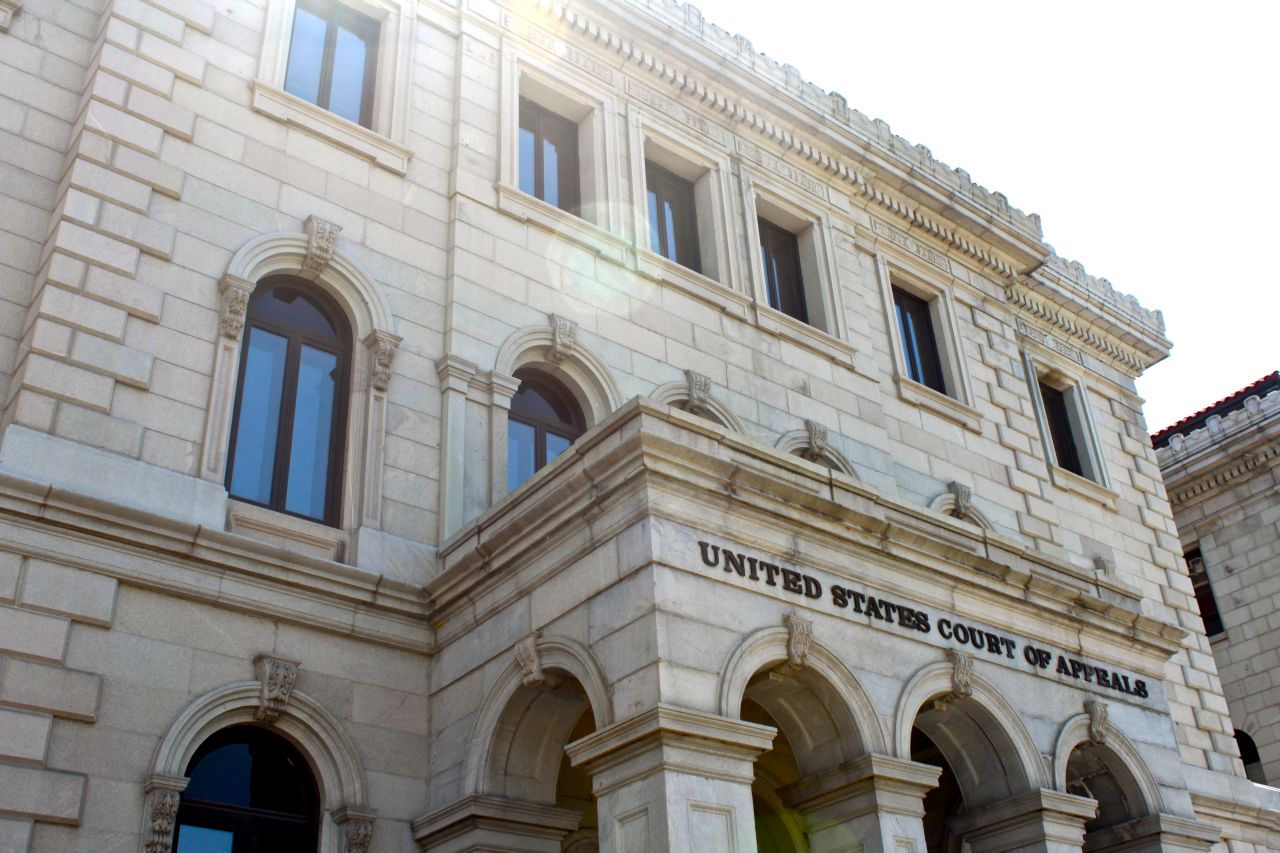
BY ERIN REED | The 4th U.S. Circuit Court of Appeals ruled Monday that transgender people are a protected class and that Medicaid bans on trans care are unconstitutional.
Furthermore, the court ruled that discriminating based on a diagnosis of gender dysphoria is discrimination based on gender identity and sex. The ruling is in response to lower court challenges against state laws and policies in North Carolina and West Virginia that prevent trans people on state plans or Medicaid from obtaining coverage for gender-affirming care; those lower courts found such exclusions unconstitutional.
In issuing the final ruling, the 4th Circuit declared that trans exclusions were “obviously discriminatory” and were “in violation of the equal protection clause” of the Constitution, upholding lower court rulings that barred the discriminatory exclusions.
The 4th Circuit ruling focused on two cases in states within its jurisdiction: North Carolina and West Virginia. In North Carolina, trans state employees who rely on the State Health Plan were unable to use it to obtain gender-affirming care for gender dysphoria diagnoses.
In West Virginia, a similar exclusion applied to those on the state’s Medicaid plan for surgeries related to a diagnosis of gender dysphoria. Both exclusions were overturned by lower courts, and both states appealed to the 4th Circuit.
Attorneys for the states had argued that the policies were not discriminatory because the exclusions for gender affirming care “apply to everyone, not just transgender people.” The majority of the court, however, struck down such a claim, pointing to several other cases where such arguments break down, such as same-sex marriage bans “applying to straight, gay, lesbian, and bisexual people equally,” even though straight people would be entirely unaffected by such bans.
Other cases cited included literacy tests, a tax on wearing kippot for Jewish people, and interracial marriage in Loving v. Virginia.
See this portion of the court analysis here:
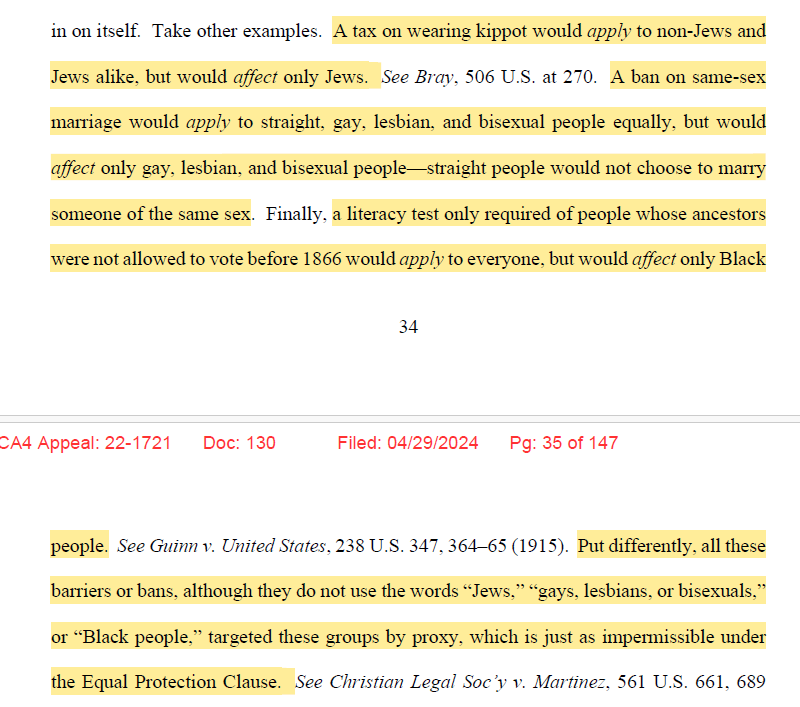
Of particular note in the majority opinion was a section on Geduldig v. Aiello that seemed laser-targeted toward an eventual U.S. Supreme Court decision on discriminatory policies targeting trans people. Geduldig v. Aiello, a 1974 ruling, determined that pregnancy discrimination is not inherently sex discrimination because it does not “classify on sex,” but rather, on pregnancy status.
Using similar arguments, the states claimed that gender affirming care exclusions did not classify or discriminate based on trans status or sex, but rather, on a diagnosis of gender dysphoria and treatments to alleviate that dysphoria.
The majority was unconvinced, ruling, “gender dysphoria is so intimately related to transgender status as to be virtually indistinguishable from it. The excluded treatments aim at addressing incongruity between sex assigned at birth and gender identity, the very heart of transgender status.” In doing so, the majority cited several cases, many from after Geduldig was decided.
Notably, Geduldig was cited in both the 6th and 11th Circuit decisions upholding gender affirming care bans in a handful of states.
The court also pointed to the potentially ridiculous conclusions that strict readings of what counts as proxy discrimination could lead to, such as if legislators attempted to use “XX chromosomes” and “XY chromosomes” to get around sex discrimination policies:
Importantly, the court also rebutted recent arguments that Bostock applies only to “limited Title VII claims involving employers who fired” LGBTQ employees, and not to Title IX, which the Affordable Care Act’s anti-discrimination mandate references. The majority stated that this is not the case, and that there is “nothing in Bostock to suggest the holding was that narrow.”
Ultimately, the court ruled that the exclusions on trans care violate the Equal Protection Clause of the Constitution. The court also ruled that the West Virginia Medicaid Program violates the Medicaid Act and the anti-discrimination provisions of the Affordable Care Act.
Additionally, the court upheld the dismissal of anti-trans expert testimony for lacking relevant expertise. West Virginia and North Carolina must end trans care exclusions in line with earlier district court decisions.
The decision will likely have nationwide impacts on court cases in other districts. The case had become a major battleground for trans rights, with dozens of states filing amicus briefs in favor or against the protection of the equal process rights of trans people. Twenty-one Republican states filed an amicus brief in favor of denying trans people anti-discrimination protections in healthcare, and 17 Democratic states joined an amicus brief in support of the healthcare rights of trans individuals.
Many Republican states are defending anti-trans laws that discriminate against trans people by banning or limiting gender-affirming care. These laws could come under threat if the legal rationale used in this decision is adopted by other circuits. In the 4th Circuit’s jurisdiction, West Virginia and North Carolina already have gender-affirming care bans for trans youth in place, and South Carolina may consider a similar bill this week.
The decision could potentially be used as precedent to challenge all of those laws in the near future and to deter South Carolina’s bill from passing into law.
The decision is the latest in a web of legal battles concerning trans people. Earlier this month, the 4th Circuit also reversed a sports ban in West Virginia, ruling that Title IX protects trans student athletes. However, the Supreme Court recently narrowed a victory for trans healthcare from the 9th U.S. Circuit Court of Appeals and allowed Idaho to continue enforcing its ban on gender-affirming care for everyone except the two plaintiffs in the case.
Importantly, that decision was not about the constitutionality of gender-affirming care, but the limits of temporary injunctions in the early stages of a constitutional challenge to discriminatory state laws. It is likely that the Supreme Court will ultimately hear cases on this topic in the near future.
Celebrating the victory, Lambda Legal Counsel and Health Care Strategist Omar Gonzalez-Pagan said in a posted statement, “The court’s decision sends a clear message that gender-affirming care is critical medical care for transgender people and that denying it is harmful and unlawful … We hope this decision makes it clear to policy makers across the country that health care decisions belong to patients, their families, and their doctors, not to politicians.”
****************************************************************************

Erin Reed is a transgender woman (she/her pronouns) and researcher who tracks anti-LGBTQ+ legislation around the world and helps people become better advocates for their queer family, friends, colleagues, and community. Reed also is a social media consultant and public speaker.
******************************************************************************************
The preceding article was first published at Erin In The Morning and is republished with permission.
National
GLSEN hosts Respect Awards with Billy Porter, Peppermint
Annual event aims to ‘inspire a lot of people to get active’

GLSEN will host its annual Respect Awards April 29 in New York, with guests including Miss Peppermint and Billy Porter.
Respect Awards director Michael Chavez said that the event will be moving.
“It will inspire a lot of people to get active and take action in their own communities and see how much more work there is to do, especially with all of the harmful things happening,” he said.
At the event, they will recognize the Student Advocate of the Year, Sophia T. Annually, GLSEN recognizes a student from around the country who is impacting their community.
“Sophia is doing incredible work advocating for inclusive sex education that is LGBTQ+ affirming, working with Johns Hopkins University to implement curriculum.” Chavez said.
Chavez calls the students that attend the Respect Awards the “biggest celebrities” of the evening.
“It is really important for the adults, both the allies and the queer folks, to hear directly from these queer youth about what it’s like to be in school today as a queer person,” he said.
GLSEN is a queer youth advocacy organization that has been working for more than 30 years to protect LGBTQ youth.
“GLSEN is all hands on deck right now, because our kids are under direct attack and have been for years now,” said actor Wilson Cruz.
Cruz is the chair of GLSEN’s National Board, which works to fundraise and strategize for the organization.
“I think we are fundamental to the education of LGBTQ students in school,” he said. “We advocate for more comprehensive support at the local, national, and federal levels so our students are supported.”
Chavez is one of the students that was impacted by this work. He led his school’s GSA organization and worked with GLSEN throughout his youth.
Cruz said Chavez is doing what he hopes today’s GLSEN students do in the future, which is pay the work forward.
“There’s nothing more powerful than people who have experienced the work that GLSEN does and then coming back and allowing us to expand on that work with each generation that comes forward,” he said.
Florida
Homeless transgender woman murdered in Miami Beach
Andrea Doria Dos Passos attacked while she slept

Gregory Fitzgerald Gibert, 53, who was out on probation, is charged with the second-degree murder of 37-year-old Andrea Doria Dos Passos, a transgender Latina woman who was found deceased in front of the Miami Ballet company facility by a security guard this past week.
According to a Miami Beach Police spokesperson the security guard thought Dos Passos was sleeping in the entranceway around 6:45 a.m. on April 23 and when he went to wake her he discovered the blood and her injuries and alerted 911.
She was deceased from massive trauma to her face and head. According to Miami Beach police when video surveillance footage was reviewed, it showed Dos Passos lying down in the entranceway apparently asleep. WFOR reported: In the early morning hours, a man arrived, looked around, and spotted her. Police said the man was dressed in a black shirt, red shorts, and red shoes.
At one point, he walked away, picked up a metal pipe from the ground, and then returned. After looking around, he sat on a bench near Dos Passos. After a while, he got up and repeatedly hit her in the head and face while she was sleeping, according to police.
“The male is then seen standing over her, striking her, and then manipulating her body. The male then walks away and places the pipe inside a nearby trash can (the pipe was found and recovered in the same trash can),” according to the arrest report.
Police noted that in addition to trauma on her face and head, two wooden sticks were lodged in her nostrils and there was a puncture wound in her chest.
Victor Van Gilst, Dos Passos’s stepfather confirmed she was trans and experiencing homelessness.
“She had no chance to defend herself whatsoever. I don’t know if this was a hate crime since she was transgender or if she had some sort of interaction with this person because he might have been homeless as well. The detective could not say if she was attacked because she was transgender,” said Van Gilst.
“She has been struggling with mental health issues for a long time, going back to when she was in her early 20s. We did everything we could to help her. My wife is devastated. For her, this is like a nightmare that turned into reality. Andrea moved around a lot and even lived in California for a while. She was sadly homeless. I feel the system let her down. She was a good person,” he added.
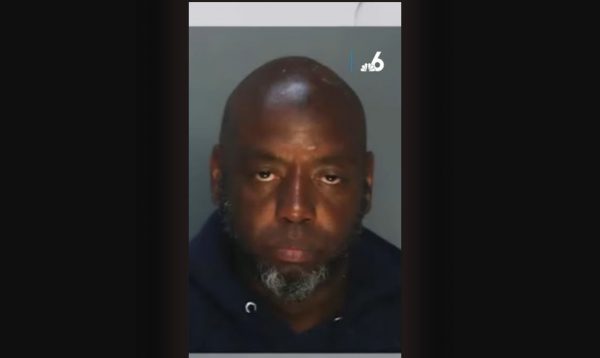
The Miami Police Department arrested Gibert, collected his clothing, noting the red shorts were the same type in the video and had blood on them. Blood was also found on his shoes, according to police. He was taken into custody and charged.
“The suspect has an extensive criminal record and reportedly was recently released from custody on probation for prior criminal charges. Police apprehended the suspect in the city of Miami and the investigation is currently ongoing. This case is further evidence that individuals need to be held accountable for prior violent crimes for the protection of the public. We offer our sincere condolences to the family and friends of the victim,” Miami Beach Mayor Steve Meiner said in a statement.
Joe Saunders, senior political director with LGBTQ rights group Equality Florida, told the Miami Herald that “whenever a transgender person is murdered, especially when it is with such brutality, the question should be asked about whether or not this was a hate-motivated crime.”







